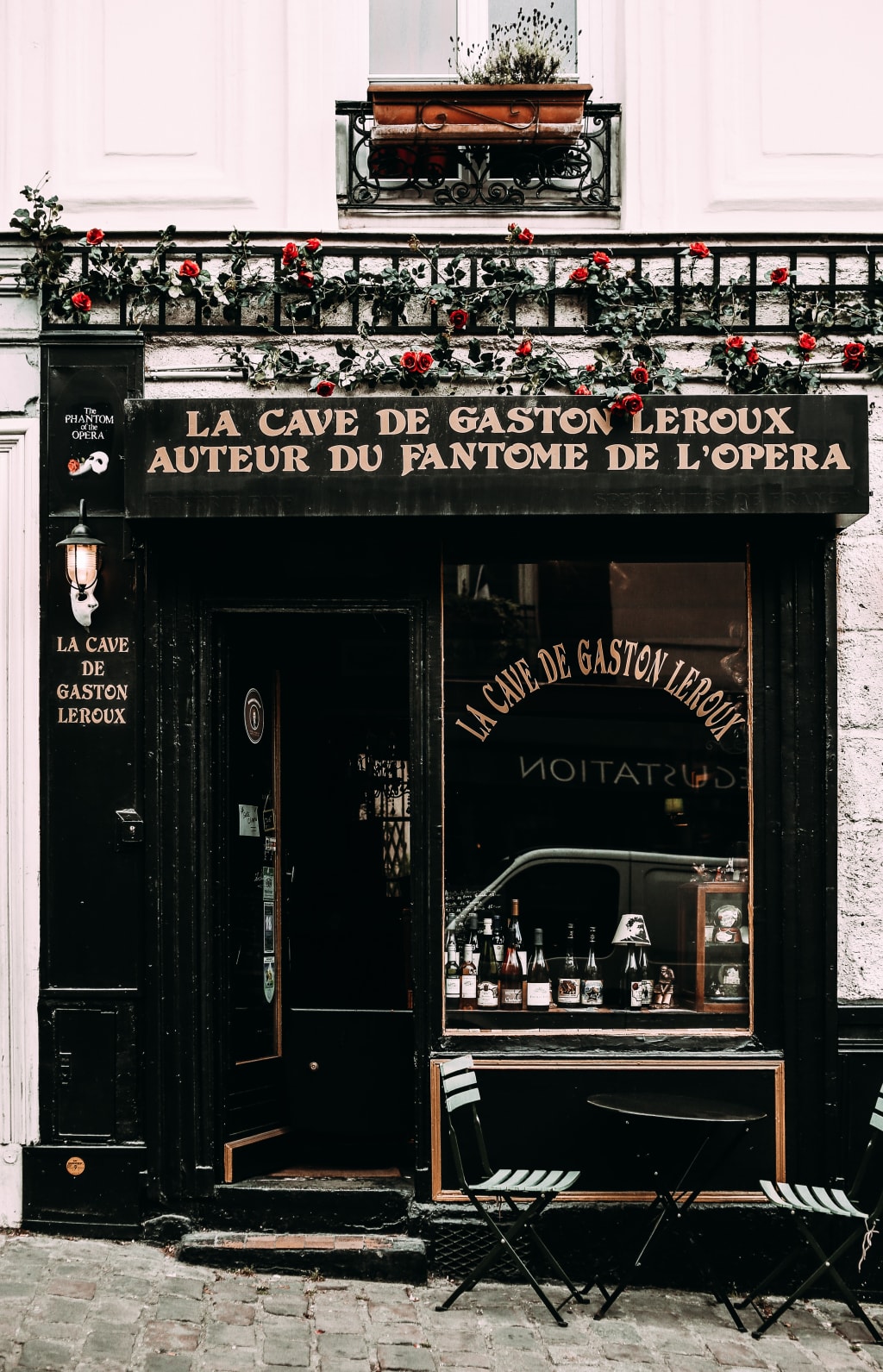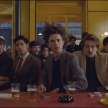The Publisher's Prejudice
Bigotry from a 1920s Café

“To my friends I am known as Mace, to my clients Mr Nase, and to you I am God.”
So spoke the elderly publisher with a kind of judicious weight on each syllable, shaking his opposite’s hand, and dressing the furniture in his coat. His entrance had heralded a collective holding of the café’s breath, and only when Mr Nase was seated were the ricochets of quotidian busyness around allowed to reanimate – albeit in his orbit. Although the room was overpopulated with the clanging of spoons on crockery and the timekeeping of invisible footsteps, their shadows were mute; the world outside the little table between these two men was intangible, a cacophony of meaning so multivalent that it seeped into their senses as white noise; but here, there was anticipation, a shared sense of gravity, as if a letter were to slide through the door imminently with the kind of news enclosed that changes a life. It was under this very gravity that the publisher leaned back for a moment and let his hands tesselate on the finely tailored trousers lining his lap. His eyes wandered around the place with a purposeful gait, apparently indifferent to the silent defiance returned by the author opposite him.
D.E Pious, the man in question, was one who had been taught self-control by an unforgiving age. This was not the first meeting he had engineered to discuss his work, and by now he had begun to recognise the stock-characters that he may be approached by, for better or worse. The role of the old-fashioned and unqualified egotist was one that had been played one too many times on his stage, abrasive at first, and now downright farcical. But tolerance was a trait most necessary for someone in his position, and the judgements that passed behind his eyes were unnoticeable enough to indulge the gentleman who called himself “God”.
“The pleasure’s all mine.”
Such a generic comment made the old man scoff. “Of that only time will tell, but before we plough on, may I recommend the chocolate cake here? It’s quite wonderful.”
In a few short moments, such things had been ordered, and found their way to the surface between them. Having appropriately aligned the cutlery on the table to form some cheap but satisfying symmetry, the publisher took a deep breath, as if to indicate the great rush of judgement that he was about to expel from his system.
“The issue is, my good man – and I take no hesitation in stating quite the literary achievement of it all, but – the wings you place on your words do not necessarily ameliorate their content.”
The muscular frame of the author languidly sat opposite could be seen to bear the brunt of this claim slightly, and as an undersized chair wheezes at the pressure from an overweight and overly excited child, did his slump and sigh allude to indignation. Entire cosmoses of stars had been crafted into being behind his eyes, and their light had often come through in the glazed, sapphire optimism possessed by water in sunlight. Such seas as these had greyed now, monochrome beneath the thrust storm clouds of experience. It was precisely this kind of uneducated, lazy, and blind remark that was cause for lightning in the eyes of D.E Pious, and yet he articulated subtler sentiments than those he harboured. “What is it you find particularly distasteful, Mr Nase?”
An immediate answer came in the rise and fall of his fingers drumming on the table, metronomically punctuating the tension. Accompanied by a tired groan, and eyes cast downward, the publisher expressed his reluctance; “Mr Pious, I am not denying the beauty of some of your writing, but did you seriously believe that I would be willing to disseminate something featuring characters like these? I mightn’t even acquire permission-”
“Characters like these?” came the confidently barbed response, placing a comforting but firm hand on the shoulder of the conversation from behind a smile. “Well yes,” Nase stammered in a rare exhibition of awkwardness, “did you really believe the ethnicity of your protagonists would go unnoticed? Unfortunately, this is more flammable still given you are a man of colour yourself.”
Nase sipped his tea defensively, cowering behind the prejudice he had knowingly expressed. The author returned a look which allowed such utterances to precipitate in the room, to gain form and inflate, until the two men were no longer pouring conversation outward to each other, so much as they were drawing it from the very mass of energy which lay between them.
“Mr Nase, I apologise if I seem rude for one moment, but I do not think you grasp the personal importance of this work; the purpose of my writing is not pleasantry, it’s to do justice to the true stories of those who feature within, stories which ought to be told.” The room seemed to raise above the hands of a conductor summoning crescendo, as his intonation came to resemble the rhythm of a stone as it skims. “A Jew, a young woman, a black man – like myself – these are not bedtime stories, they are vignettes of identification that have deserved publication for much longer than I have been putting pen to paper. I have made many promises to many people over this, and I intend to keep them. If I may not do so at this establishment, I will wander to the next. Good day.” With this he stood and straightened his coat, but was to go no further at this particular moment. “Sit down, Mr Pious.” came the publisher’s hasty and uneasy response - so eager was he to maintain control that he only gave the impression of having none of it - and the author obeyed, slowly easing himself downward as to emphasise the fragility of the conditions upon which he remained.
As the one lowered, the other raised, opposing platforms of a scales. With the unnatural straightness of back possessed by schoolboys in the headmaster’s office, he sat up, brushing himself of a few crumbs in haste. “Mr Pious, for what reason does the reader turn to a novel?” This was left hanging in the air but was evidently a question not to be dignified with a response, but rather to fall as a feather to the floor. “Is it the insight into the psyche that a mind such as Dostoevsky’s can bring? Is it the bizarre and teleportative qualities enclosed between the creamy pages of a relic from a time before, or about a time to come – Ovid, Apuleius, even Lucian for goodness’ sake? Or is it the mere material comfort found in the weight of a novel in one’s hands, an anchor into which one can pour their utmost attention, and mute the terrible pangs of life outside? The truth is, my good man, we cannot attribute it to one concrete and eternal fact; we may speculate, analyse, dissect, but when all is said and done, when one looks upon a Titian, he does not see the pigments, so much as he is left in awe by their effect. One does not try to justify the tears they cry when they hear the third Liebestraume for the first time, but they are cried, nonetheless. To my mind – and Vasari’s, for that matter – it is because these art forms tell us about ourselves without us necessarily looking for it, holding up a mirror in which we can inadvertently examine every excruciating thread in the tapestry of the human condition”. The words were bubbling up from within him now, and the passions previously yoked by professionalism had torn their tethers, racing outward in all directions, sound from a Wurlitzer. “It is for this very reason that the same words can elicit an infinite number of readings; whether that be from different people and the differing experiences they have had up to reading it – which, obviously, naturally define how it is interpreted – or even the same person, at different points in their life! And it is for this very reason that every single day since - what was it, 17, 19 BCE? – yes, 19 BCE, someone somewhere has sat down to read The Aeneid!” The publisher’s hands had clenched in fists that appeared to cling onto the very sentiments he was uttering, shaking and desperate as to not let them slip into the aether, and as they slowly unfurled, both his ideas and the smile that had spontaneously inflated his face seemed to evaporate. The strings under which he had been made zealous were drawn back, and the man was dressed in forty years as his refined and pessimistic manner returned. “And yet, Mr Pious, the reasons for why someone buys a book are not so profound. Enjoyable though your histories were to me, I do not consider myself the target demographic. Even if I fought to get such explicit descriptions on the shelf, who is to say they would not simply be left there, ignored for the sake of some Mills and Boon escapist nonsense?” He took a breath to let his words reverberate in his client’s ears, inflating and rising as he did, before turning to pin his gaze directly upon the author. Pious was dumbstruck. He had not expected this ferret of a man to be capable of uttering such fine words, of adopting the persona his facial hair would have associated him with, but he remained stoical nonetheless, in anticipation of something more to come. “It really is frightening; the standards we lower ourselves to by the day, don’t you think? Goodness, I fear for the future; we may leave ourselves no better than the animals in the absence of genuine engagement with literature.” He shook himself of this afterthought, sat down, and returned to the true point of the monologue: “And so my question for you, Mr Pious - regardless of the respect you beckon from me in your craftsmanship and your intentions – is why should I take such pains with your piece, knowing one copy mightn’t be shifted?”.
There was silence once more, and after a brief pause, the man in the chair grinned the grin of a player one move prior to mate. Pious chose his next words with the delicate care of a concert pianist to his keys, sliding and brushing over each note as to engineer a tender cadence for his listener, rather than hammering the true arrogance of his sentiment into the man. With a swagger observable in very few that are entitled to it, he took out the briar curves of a pipe shimmering in the sparse sunlight of mid-afternoon, and let flame curve at its lip until wisps of smoke created an apt air of enigma to back his scene. Satisfied, the gentleman rose, gathered the paper together, and slid it across the desk, muttering these last few words before waltzing out of the room.
“If you will permit me a few pages more, might I ask that you conclude the novel before concluding your thoughts on it?”
About the Creator
Enjoyed the story? Support the Creator.
Subscribe for free to receive all their stories in your feed. You could also pledge your support or give them a one-off tip, letting them know you appreciate their work.






Comments
There are no comments for this story
Be the first to respond and start the conversation.